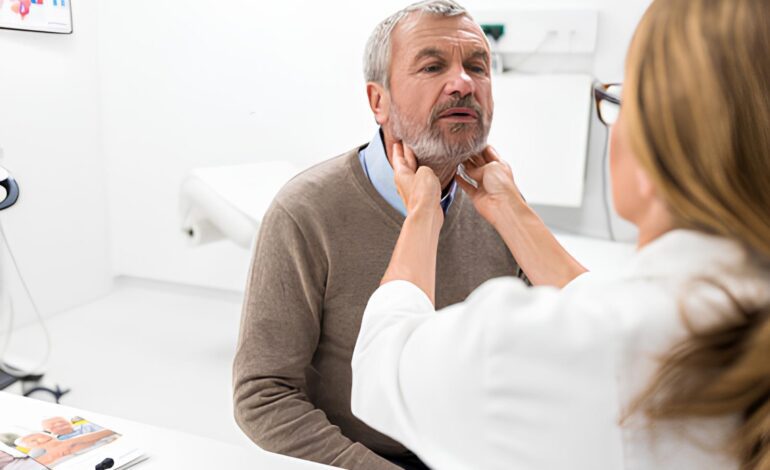DETROIT— The Barbara Ann Karmanos Institute and cancer centers and organizations across the nation recognize April as Head and Neck Cancer Awareness Month. Head and neck cancers include:
- Ear cancer
- Eye cancer
- Hypopharyngeal cancer
- Laryngeal cancer
- Nasal cavity cancer
- Nasopharyngeal cancer
- Oral cavity cancer
- Oropharyngeal cancer
- Paranasal sinus cancer
- Salivary gland cancer
Melanoma and sarcoma also can occur in the head and neck region.
Head and neck cancer symptoms and early detection
According to the Karmanos Institute, there are no comprehensive screening tests for head and neck cancers, but pre-cancers and cancers in the region can be be detected during routine doctor and dentist visits as well as by self-exam.
“It’s important to be vigilant and pay attention to any changes in the mouth, around the neck and lymph node areas,” said Ammar Sukari, M.D., medical oncologist and leader of the Head and Neck Oncology Multidisciplinary Team (MDT) in a press release. “Sometimes, an odd lump or interesting sore can amount to nothing, but it’s best to check with a physician – we know the earlier we can catch these cancers, the better treatment options we can provide patients.”
Possible signs and symptoms of oral cavity and oropharyngeal cancers include:
- A persistent sore throat.
- A neck lump or mass.
- A sore in the mouth that does not heal.
- A white or red patch on the gums, tongue, tonsil, or mouth lining.
- Constant bad breath.
- Loosening of the teeth or pain around the teeth or jaw.
- Numbness.
- Pain in the mouth.
- Swelling.
- Trouble chewing or swallowing.
- Trouble moving the jaw or tongue.
- Voice changes.
HPV and head and neck cancer
The human papillomavirus (HPV) and head and neck cancers have a strong link. HPV is a sexually transmitted virus that is so prevalent that the Centers for Disease Control and Prevention (CDC) stated that roughly every sexually active person will contract HPV at some point throughout their life, according to the Karmanos Institute.
With more than 100 HPV subtypes — that can infect humans — those infected with the virus typically do not show symptoms. 20-40 subtypes of HPV can cause cancer, while nine out of 10 cases are self-clearing.
“Throat cancer is one of the leading head and neck cancers that HPV can cause,” Sukari said. “With the HPV vaccine, many are now able to prevent most HPV-related cancers from developing due to the virus, which will help save a lot of lives down the road.”
“The HPV vaccine, also known as Gardasil®, was initially approved by the U.S. Food and Drug Administration (FDA) in 2006 to prevent cervical cancer linked to HPV,” the Karmanos Cancer Institute said in a press release. “In 2018, the FDA approved a supplemental application for Gardasil® 9, expanding the vaccine’s approved use to include women and men aged 27 through 45. Gardasil® 9 prevents certain cancers and diseases caused by the nine HPV types covered by the vaccine, including oropharyngeal cancer.”
Head and Neck Cancer Treatment at the Karmanos Cancer Institute
Head and neck cancers at Karmanos are treated by the members of the Head and Neck oncology MDT. This team includes surgical oncologists, medical oncologists, radiation oncologists, neuroradiologists, interventional radiologists, endocrinologists, facial and reconstructive surgeons, oral oncologists and dentists, maxillofacial prosthodontists, speech and swallow therapists, pathologists, pharmacists, dietitians, social workers and genetic counselors.
“Our team uses the latest technologies, including the da Vinci® Si™ Surgical System, stereotactic radiation, and cryotherapy, to achieve optimum patient success,” Sukari said. “We also offer multiple clinical trials to treat head and neck cancers.”
How can it affect Arab Americans?
While there is a lack of statistical data about the prevalence of head and neck cancer in Arab Americans, Sukari told The Arab American News he often sees several head and neck cancers among Arab American patients.
“From my clinical observation, I see a significant number of Arab American patients with laryngeal cancer, thyroid cancer and other types of head and neck cancer caused by tobacco use, especially in the form of hookah,” he said.
Hookah, a form of smoking, is largely popular across Middle Eastern culture. With a heightened use, this can contribute to a heightened risk of developing cancer in the head and neck region.
Head and neck cancers, Sukari said, are very preventable by maintaining a healthy lifestyle.
“In addition, people of northern African and Middle Eastern origin have a high risk of nasopharyngeal cancer in comparison to Americans. It is crucial to pay special attention to any symptoms suggesting nasopharyngeal cancer.”
If you have been diagnosed with a head and neck cancer, call 1-800-KARMANOS or visit karmanos.org for access to comprehensive care and more information.






Leave a Reply